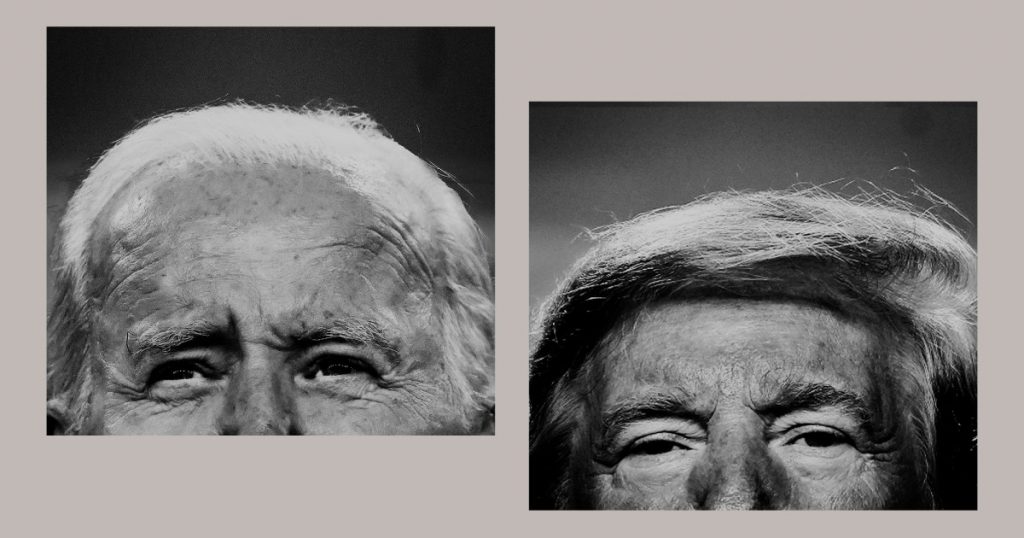What We Lose by Armchair Diagnosing Biden and Trump
Mother Jones illustration; Beata Zawrzel/ZUMA; Drew Angerer/Getty
Fight disinformation: Sign up for the free Mother Jones Daily newsletter and follow the news that matters.Last week, a special counsel report looking into President Biden’s handling of classified documents described the president’s memory as “poor,” with “significant limitations.” Speculation about Biden’s cognitive state immediately followed. In its coverage, Fox News featured a doctor—not Biden’s—who said the president had symptoms of age-related dementia. Also stopping by the network was Republican Sen. Marco Rubio, who said Biden either had dementia or should be charged with a crime. Some Democrats, in response, pointed not just to Donald Trump’s own mishandling of classified documents, but to the former president’s memory lapses. A CNN medical analyst has also previously suggested in a tweet that Trump’s difficulty with a cognitive test may signal the onset of dementia.
Both Biden, 81, and Trump, 77, have been criticized for their age and supposed cognitive capacity issues for years. In 2019, Biden and Trump went back and forth back and forth in insisting that they had more energy than their opponent. Trump and his supporters have an affinity for calling Biden “Sleepy Joe”; Biden himself said that questions about his age were “totally legitimate” in 2018, when he was considering his first run for the presidency. Trump did take a cognitive assessment the same year, following concerns about his mental fitness; a Mayo Clinic neurologist said the test, is “ultimately only a first pass at cognition.”
“It’s certainly not appropriate for a clinician to comment on the capacity of a politician” in the media, said Dr. David Merrill, a geriatric psychiatrist and director of the Pacific Neuroscience Institute’s Pacific Brain Health Center.
It is appropriate for people to judge Biden and Trump by their actions. How either mishandled classified documents could be a dealbreaker. How either handles foreign policy, like unconditional funding to the Israeli government, could be a dealbreaker. Trump calling neo-Nazis “very fine people” and then defending it a few years later can also be a dealbreaker. But associating supposed bad actions with age, and aging-related health issues, can lead to these conditions being further stigmatized.
All voters have different dealbreakers, regardless of a politician’s age. Who’s suitable for the White House gets decided at the polls and can be addressed by Congress. Lawyers untrained to understand age-related memory issues making claims about a public figure’s health is a different story.
Stigma around dementia, according to the CDC, could discourage people from sharing their symptoms with their doctors. The report itself, according to Brenna Renn, a University of Nevada, Las Vegas, psychology professor and clinical geropsychologist, used “damning language” that was rife with ageism.
“They’re suggesting that a mental state of willfulness is incompatible with one’s status as an octogenarian,” Renn said of the special counsel report. “I think that perpetuates bias.”
Renn believes that throwing around armchair diagnoses like dementia for public figures steamrolls what’s “actually a really complicated construct” that requires firsthand evaluation by a healthcare provider. “It’s also very nuanced when we look at decision-making capacity,” Renn said. “Some of this report was like, ‘Oh, this is a poor elderly man and he has memory problems,’ and that’s just not readily true.”
But Merrill does ask why sitting presidents aren’t required to have a cognitive exam. This wouldn’t mean that anyone with cognitive disabilities would be unable to hold office—the standard would be whether they could do their job with reasonable accommodations. Those accommodations, under the Americans with Disabilities Act, could include getting a transcript of a meeting, taking more breaks, and scheduling around doctor’s appointments.
Aging-related cognitive issues will become increasingly common, with more and more Americans projected to live past the age of 65. US politicians are also older now than they have been historically. Pitting both Biden and Trump’s supposed cognitive issues against each other in partisan discourse has turned age-related health issues into political jabs, at the expense of people with conditions like dementia and other age-related memory loss.
“If somebody actually has a dementia process happening, if they don’t initiate the conversation with their doctor and seek assessment, then families might not necessarily be prepared to support the person,” Renn said. “Such remarks may very well contribute to this fear,” Merrill said, “Isn’t the threat that they’ll lose their job, or not be allowed to run for re-election?”





